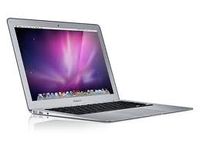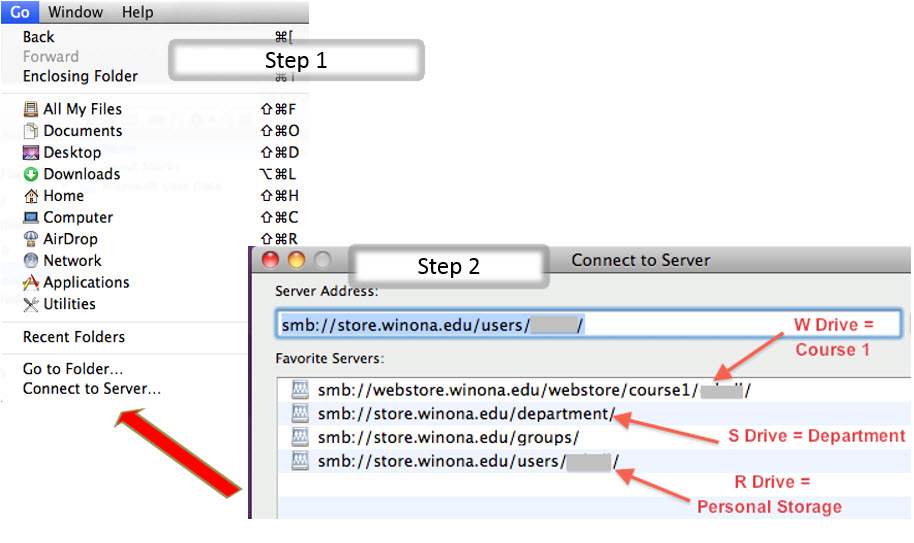Set up your new Mac laptop
About this article
This article provides the steps to setup your new Mac laptop so that you are work ready. It is intended for all students and employees participating in the E-Warrior Digital Life and Learning Program.
Hardware overview
There are many new changes to both platforms (i.e. PC and Mac) this year that have many implications for how we use our laptops in and outside the classroom. It is strongly recommended that you check out the article New laptop and tablet feature to best support you in the use of your devices, but also to help your students who may use the other platform in your classes.
No network port
The MacBook is the first Apple laptop without a standard RJ45 network port. Our campus wireless network provides dependable and pervasive WiFi coverage. Those who still want a wired connection can use a Thunderbolt to Gigabit Ethernet Adapter.
Thunderbolt port
Beginning in summer 2011, Apple began replacing the Mini DisplayPort port with a new Thunderbolt port. The port has the same shape as the Mini DisplayPort and accommodates any Mini DisplayPort adapter you may have purchased previously. For example, if you have a Mini DisplayPort to VGA adapter that you use to connect your current MacBook to a projector, this will work with your new MacBook. The benefits of Thunderbolt include an increased data transfer rate (10 Gb/sec) and the ability to connect high-resolution displays and high-performance data devices through a single port. For more information, consult Apple's Thunderbolt FAQ article.
Take a look at the hardware features of your Apple MacBook Pro
How to connect to a projector or second monitor
Connecting your new Mac laptop to a projector or second monitor requires a MiniDisplay Port to VGA adapter (a.k.a. dongle) to connect to the VGA cable in the classroom or monitor. Once your cabling is connected you can learn all about how to configure your Display Preferences.
Trackpad setup
One of the most frustrating parts of exchanging laptops is remembering the setting you had on your old laptop and how to configure these setting on your new laptop. This video below provides an excellent overview of the key settings on your new device. Remember, the folks at Apple are trying to make the touch components of your devices (i.e iPad, iPhone, iPod) as similar an experience as they can.
Software
Operating system
If you are already a MacBook Pro user and have not upgraded to the new Yosemite version of operating system, this will be pre-installed on your new MacBook Pro and does include a number of new features and functions. If this is your first Mac laptop, you will need to spend some time familiarizing yourself with the Mac operating system.
Supported software
Install software from WSU Additions
- WSU Additions is a space where you can add software to your MacBook Pro. This article (Click here for Installing Software From The Network) the process for accessing and loading additional specialty software.
- On your new laptop you will see that the Creativity and Productivity programs (iPhoto, iMovie, Garageband, etc) are now all apps you load from the Apple App Store or you can learn more and download these on to your new device.
Configuring Outlook
Outlook is our email software that allows you to download and work on email anytime. The following video walks you through the processes of configuring your email account so that you can use this tool.
Printer setup
Setting-up WSU printers can be done by going to WSU_Additions within the programs menu. This article ( Click here to Setup Printers on a Mac) has a great video and detailed directions for setting up a WSU networked printer. Connecting to WSU network printers the first time might necessitate that you plug in (Ethernet cable) within your area to see all available printers. The Setting Up Printers On A Mac article also walks you through the steps of finding and making your default printer.
Network access from off campus
To access WSU network drives, printers and certain web-based software you must use the Cisco VPN Client to establish a virtual private network (VPN) connection to WSU from off campus. To learn how to connect using Cisco VPN Client by going to this article Cisco AnyConnect Secure Mobility Client.
File storage
In addition to storing documents and other files on your laptop it is strongly suggested that you start storing these files in a combination of Cloud Storage (i.e. OneDrive for Business) and WSU network servers. The following two sections help you understand how to connect to and use these resources to store files off of your laptop in case it were stolen or broken.
Cloud storage - OneDrive for Business
WSU's supported cloud storage. All students and employees receive 1 TB of cloud storage on Microsoft's OneDrive for Business. Note: There is also a OneDrive for consumers that you can install that is not associated with the WSU's OneDrive for Business storage.
How to access your OneDrive for Business
Connecting to network servers
Servers (i.e. network storage) is an additional storage space set up for employees designed to be extremely secure. This space is where any sensitive student data or other financial information should be stored. If you have questions about this data please check out the Digital Security section below or go to this secure wiki on Digital Security]. To access your network storage you will need to activate Finder. Next (Step 1) click on the Connect to Server option and you will see a list (step 2) of servers to choose from.
*Course1: site is space for web pages.
*Department: this is space accessible by anyone within your department or unit.
*Groups: this is space set up specially for different groups, teams, committees and is accessible to any employee serving in that group.
*User: personal space that accessible to you
Digital security
Addressing security threats and managing risk is a vital part of our eWarrior program and extensive documentation can be found here to educate yourself on the many measures that can be taken to prevent data breaches or spread of harmful viruses and malware.
- Information Security siteWSU's digital security information and policies that are pertinent to WSU employees.
- Every state employee is required to take the D2L based Public Jobs Private Data course
- Know where to store your data
- Know your data
- What is Malware?
- What is Phishing?
- Use the program KeePass to store your passwords in an encrypted database. You never want to put your passwords on a sticky note!
- Take a workshop on Digital Security. These workshops are offered each semester, but if there are no workshops listed, you can Request a Workshop.
Password managment with KeePass
KeePass is WSU's recommended password safe or password manager. Click here to learn all about how KeePass works and how to install this program so that you can better manage your passwords.
LinkedIn Learning
Need help with software, try LinkedIn Learning online tutorials. With a LinkedIn Learning account, you will have access to thousands of videos on software, hardware, and many other topics designed to help you do your job better. Learn more about LinkedIn Learning and how to create your profile by going here.



